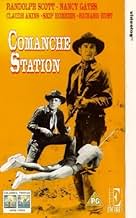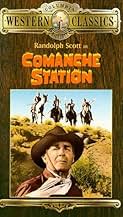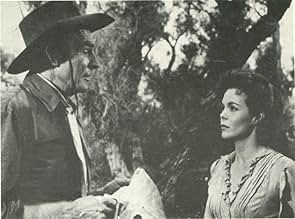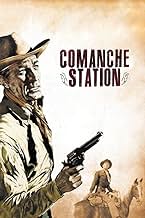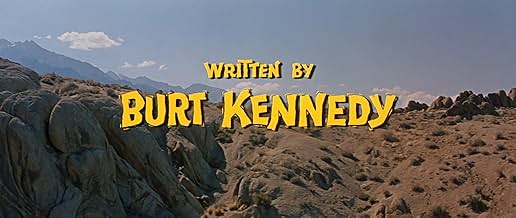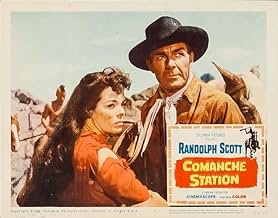IMDb RATING
7.0/10
4.9K
YOUR RATING
A man saves a woman who had been kidnapped by Comanches, then struggles to get both of them home alive.A man saves a woman who had been kidnapped by Comanches, then struggles to get both of them home alive.A man saves a woman who had been kidnapped by Comanches, then struggles to get both of them home alive.
- Director
- Writer
- All cast & crew
- Production, box office & more at IMDbPro
7.04.8K
1
2
3
4
5
6
7
8
9
10
Featured reviews
If I loved her, it wouldn't matter.
Comanche Station is produced and directed by Budd Boetticher and stars Randolph Scott, Claude Akins, Nancy Gates, Skip Homeier & Richard Rust. It's written by Burt Kennedy with music and cinematography from Mischa Bakaleinikoff & Charles Lawton Jr. respectively.
Jefferson Cody has for many years been looking for his wife who was kidnapped by Indians. Taking time out from his futile search, he trades with the Comanches to get a woman, Nancy Gates, released. During the journey back to reunite Nancy with her husband, they run into an outlaw and his two protégés. Stating that the Comanches are on their trail and speaking about a reward being offered for Nancy, relations start to disintegrate by the hour.
This was to be the last of seven collaborations between director Budd Boetticher and Western legend Randolph Scott, and it's a most fitting sign off from the duo. Between them they managed to make Westerns with an almost haunting cloud hanging over them, themes of loneliness, complex characters and scenarios segue throughout their output. Here in this fine picture we find Scott's Cody in a complete state of loneliness, but outside of the pain the character clearly carries with him, Cody is a classic Western hero, courage and integrity are fortitude's by which he lives his life.
As this tale unfolds it's evident that Boetticher isn't prepared to offer up conventional Western standards, this, like many of Boetticher's other Westerns, is not a standard Oater, a good versus evil fable, it's a cunningly intelligent picture that's both sad in texture, and also in heart. The film is boosted by Charles Lawton Jr's camera work as he captures some stunning outdoor scenery, the rugged rocks and dusky land creates some striking compositions around the troubled characters.
See this if you are one of those people who thinks Westerns were merely an excuse for Cowboys and Indians high jinx. Boetticher and Scott, leading lights in the sub genre that featured the Ranown Westerns. 8/10
Jefferson Cody has for many years been looking for his wife who was kidnapped by Indians. Taking time out from his futile search, he trades with the Comanches to get a woman, Nancy Gates, released. During the journey back to reunite Nancy with her husband, they run into an outlaw and his two protégés. Stating that the Comanches are on their trail and speaking about a reward being offered for Nancy, relations start to disintegrate by the hour.
This was to be the last of seven collaborations between director Budd Boetticher and Western legend Randolph Scott, and it's a most fitting sign off from the duo. Between them they managed to make Westerns with an almost haunting cloud hanging over them, themes of loneliness, complex characters and scenarios segue throughout their output. Here in this fine picture we find Scott's Cody in a complete state of loneliness, but outside of the pain the character clearly carries with him, Cody is a classic Western hero, courage and integrity are fortitude's by which he lives his life.
As this tale unfolds it's evident that Boetticher isn't prepared to offer up conventional Western standards, this, like many of Boetticher's other Westerns, is not a standard Oater, a good versus evil fable, it's a cunningly intelligent picture that's both sad in texture, and also in heart. The film is boosted by Charles Lawton Jr's camera work as he captures some stunning outdoor scenery, the rugged rocks and dusky land creates some striking compositions around the troubled characters.
See this if you are one of those people who thinks Westerns were merely an excuse for Cowboys and Indians high jinx. Boetticher and Scott, leading lights in the sub genre that featured the Ranown Westerns. 8/10
Short T
Saw this film again tonite via the DVD, mainly because it's Scott's penultimate film. Immediately thought of similarity to Scott's The Tall T, later to Ride Lonesome and Seven Men from Now. Difference is I'd give that Elmore Leonard story a few notches on this. Claude Akins is better than just Movin On but doesn't have the menace of Richard Boone or Lee Marvin. Scenery is favored over dialogue. Lots of cutting from scene to scene to indicate time has passed. Skip Hoemeier reprises his role as number 2 gun hand to the villain (Billy Jack to Boone ). Scott is great trading with the Comanche or getting the drop on the bad guys. Lots of good but familiar dialogue- "Seemed like a good idea". He is the archetype noble cowboy true to his values and keeping his dignity, yet always practical. I like this film very much and will watch it again; I'm sure.
Randolph Scott's never-ending search for wife taken by Comanches
After Comanches took his wife away years ago, Randolph Scott's character spends his time tracking down stories of white women abducted by Comanches in hopes of rescuing his wife from captivity. How many white women under Comanche captivity he has come across is unknown, but the one he barters for in Comanche Station (Nancy Gates) also turns out not to be his wife. Even though he strikes out again in his own search, the fact that he is going to return Gates to her family forms a compelling storyline. Scott and Gates travel to a stage coach stop known as Comanche Station where Claude Akins and two young associates, Richard Rust and Skip Homier, await the stage coach's arrival to rob it. Needless to say the coach doesn't get there, but Akins knows Gates's husband has promised to pay $5,000 for her return, a detail of which Scott apparently was unaware. Thus the five ride off on the journey to return Gates, Akins intent on killing Scott, whom he knew before, in order to collect the reward for Gates, who is very beautiful. There is excellent acting along the journey, thanks to a stand out script by Burt Kennedy and direction by Scott's famous partner in westerns Budd Boetticher.
The Western, Distilled to its Essence...
Howard Hawks was once asked about his recipe for making a great film. His reply: "Three good scenes, no bad scenes". I would humbly add two other rules: A great film is one where no additional scene is needed, and no existing scene could have been cut. Few competent directors violate the first rule. The mark of a great director is the ability to follow the second. Many inferior directors are too shallow or too vain to understand this - they constantly strive to include superfluous or redundant scenes - Just To Make Sure You Got The Point - when it is wiser to let the audience decide what is important. John Ford was the master at this. Hawks, Wilder, Eastwood, also come to mind. With Commanche Station, Budd Boetticher showed that he knew how to distill a great story (with many elements of a Greek tragedy) to its most basic human elements - Obsession, Greed, Loyalty, Irony, and above all, Honor.
Not only did Boetticher direct a great film, Burt Kennedy (later to become a fair director himself) constructed a great script.
Some good scenes: A conversation between a woman who was taken captive by Commanches (and held for a time) and the stranger who has just paid her ransom... Nancy Lowe: If-if you had a woman taken by the Comanche and-and you got her back... how would you feel knowing? Jefferson Cody: If I loved her, it wouldn't matter. Nancy Lowe: Wouldn't it? Jefferson Cody: No ma'am, it wouldn't matter at all.
Or two friends, hired guns both, contemplating the need to commit a horrible crime for money: Frank: You want to go to work, do you? Dobie: Work? Frank: Making an honest living? Dobie: Oh, no, I don't think I could do that. I could cowboy some. Frank: Well, what will that get you? You work yourself to death for somebody and likely they will have to take up a collection to bury you.
Or a conversation between an honorable man and a young man trying to decide whether he will try to become one: Dobie: A saddle and a shirt, that's all Frank had. It sure ain't much. Jefferson Cody: Sure ain't. Dobie: It wasn't his fault, though. Jefferson Cody: No? Dobie: No, he never knew anything but the wild side. Jefferson Cody: A man can cross over anytime he has the mind.
As for the performances, they are uniformly good. Nancy Gates, Skip Homier, Richard Rust, and Claude Akins hit the right tone - never going too far for a laugh or a tear.
And Randolph Scott was perfect - A word I do not use lightly. Roger Ebert once said that Marlon Brando and Paul Newman started out on the same path: Both came on the scene in the early 1950s, both studied the Method, both looked good in an undershirt. But Brando went on to see what else he could throw in to his performances while Newman went on to see what he could leave out (Newman once said that he was dissatisfied with many of his early performances because "you could see the acting"). In Commanche Station, Randolph Scott provided the inspiration for such an approach. This is what makes a performance (indeed, a film) memorable - by distilling your performance to only that which is necessary, you allow the viewer to remember what is important to them, not what they are told should be important to them.
If I were held to only half a dozen westerns to be labeled as essential, this would be one of them (The others: My Darling Clementine (1946), Shane (1953), The Searchers (1956), The Man Who Shot Liberty Valance (1962) and Unforgiven (1992)).
Not only did Boetticher direct a great film, Burt Kennedy (later to become a fair director himself) constructed a great script.
Some good scenes: A conversation between a woman who was taken captive by Commanches (and held for a time) and the stranger who has just paid her ransom... Nancy Lowe: If-if you had a woman taken by the Comanche and-and you got her back... how would you feel knowing? Jefferson Cody: If I loved her, it wouldn't matter. Nancy Lowe: Wouldn't it? Jefferson Cody: No ma'am, it wouldn't matter at all.
Or two friends, hired guns both, contemplating the need to commit a horrible crime for money: Frank: You want to go to work, do you? Dobie: Work? Frank: Making an honest living? Dobie: Oh, no, I don't think I could do that. I could cowboy some. Frank: Well, what will that get you? You work yourself to death for somebody and likely they will have to take up a collection to bury you.
Or a conversation between an honorable man and a young man trying to decide whether he will try to become one: Dobie: A saddle and a shirt, that's all Frank had. It sure ain't much. Jefferson Cody: Sure ain't. Dobie: It wasn't his fault, though. Jefferson Cody: No? Dobie: No, he never knew anything but the wild side. Jefferson Cody: A man can cross over anytime he has the mind.
As for the performances, they are uniformly good. Nancy Gates, Skip Homier, Richard Rust, and Claude Akins hit the right tone - never going too far for a laugh or a tear.
And Randolph Scott was perfect - A word I do not use lightly. Roger Ebert once said that Marlon Brando and Paul Newman started out on the same path: Both came on the scene in the early 1950s, both studied the Method, both looked good in an undershirt. But Brando went on to see what else he could throw in to his performances while Newman went on to see what he could leave out (Newman once said that he was dissatisfied with many of his early performances because "you could see the acting"). In Commanche Station, Randolph Scott provided the inspiration for such an approach. This is what makes a performance (indeed, a film) memorable - by distilling your performance to only that which is necessary, you allow the viewer to remember what is important to them, not what they are told should be important to them.
If I were held to only half a dozen westerns to be labeled as essential, this would be one of them (The others: My Darling Clementine (1946), Shane (1953), The Searchers (1956), The Man Who Shot Liberty Valance (1962) and Unforgiven (1992)).
Your basic solid western with a twist ending
A magazine article recently cited this movie as an underrated western. I certainly agree. Randolph Scott made his best westerns in the latter part of his career, and this is one of those. The movie examines the old west moral code of right v. wrong and raps up with a surprising twist ending that gives cynicism a kick in the rear end. Not a big splashy western, but a solid little one.
Did you know
- TriviaLast of the "Ranown Westerns", produced by Randolph Scott and his partner Harry Joe Brown under the Ranown Pictures banner. Scott decided to retire after this one, but two years later he was talked out of retirement by Sam Peckinpah for Ride the High Country (1962). After that film, Scott retired for good.
- GoofsDuring the final shootout with Claude Akins, Randolph Scott and Nancy Gates run and hide in a small rock cave in the hills. As they look out of the cave, a crew member in a blue shirt stands in the path in front of them. When Randolph Scott leaves the cave, he runs right past this crew member.
- ConnectionsFeatured in The Guardian Interview with Budd Boetticher (1994)
- How long is Comanche Station?Powered by Alexa
Details
- Runtime
- 1h 13m(73 min)
- Aspect ratio
- 2.35 : 1
Contribute to this page
Suggest an edit or add missing content


